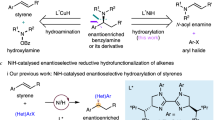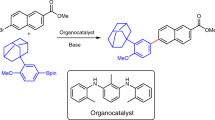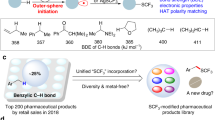Abstract
The chemistry of α-alkylated arylhydrazines is familiar, but the corresponding α-acyl compounds have received no attention owing to their comparative inaccessibility. It will, however, now be possible to repair this deficiency as a result of our observation that salts of these compounds are produced together with carbon dioxide quantitatively at once when a solution of a sydrione in benzene is treated successively with a molecular proportion of water and of hydrogen chloride or bromide in ether1. We relate the extreme facility of this decomposition in its last stage to the benzidine change and formulate it as follows:
This is a preview of subscription content, access via your institution
Access options
Similar content being viewed by others
References
Compare Earl and Mackney, J. Chem. Soc., 899 (1935).
Wilson Baker, J., and Ollis, W. D., Nature, 158, 703 (1946). Kenner, J., and Mackay, K., Nature, 158, 909 (1946). Earl, J. Campbell, Nature, 158, 909 (1946).
Author information
Authors and Affiliations
Rights and permissions
About this article
Cite this article
KENNER, J., MACKAY, K. α-Acyl Hyclrazines. Nature 160, 465–466 (1947). https://doi.org/10.1038/160465b0
Issue Date:
DOI: https://doi.org/10.1038/160465b0
Comments
By submitting a comment you agree to abide by our Terms and Community Guidelines. If you find something abusive or that does not comply with our terms or guidelines please flag it as inappropriate.



